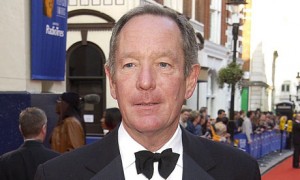
![]() This article titled "Michael Buerk savages BBC's coverage of Queen's diamond jubilee" was written by Caroline Davies, for guardian.co.uk on Sunday 30th December 2012 14.23 UTC
This article titled "Michael Buerk savages BBC's coverage of Queen's diamond jubilee" was written by Caroline Davies, for guardian.co.uk on Sunday 30th December 2012 14.23 UTC
The broadcaster Michael Buerk has heavily criticised the BBC's coverage of the Queen's diamond jubilee, saying it was "cringingly inept" and had left him ashamed.
The outspoken former BBC foreign correspondent and newsreader said what should have been a celebration instead became an event in which "the one enduring British institution was mocked by another that had shamefully lost its way".
In an end-of-year commentary for the Mail on Sunday, Buerk, 66, singled out the corporation's coverage of the Thames river pageant for particular ire, and was scathing about the BBC presenters' performances.
"Out on the water, a tribute to the Monarch that resonated back to the Middle Ages, rich in historical continuities, a floating salute to past glory and present fortitude. On the screen, a succession of daytime airheads preened themselves, or gossiped with even more vacuous D-list 'celebrities'", he wrote.
"With barely an exception, they were cringingly inept. Nobody knew anything and nobody cared. The main presenter couldn't even work out what to call the Queen".
He continued: "The Dunkirk Little Ships, the most evocative reminders of this country's bravest hour, were ignored so that a pneumatic bird-brain from Strictly Come Dancing could talk to transvestites in Battersea Park".
"I was so ashamed of the BBC I would have wept if I hadn't been so angry," said Buerk, a BBC newscaster until 2002 and who now presents BBC Radio 4's The Moral Maze.
This celebration of "what the country was" had been "betrayed" by what it is now, he said. In an attack on George Entwistle – then head of BBC Vision, who resigned as director-general after 54 days with a payoff worth £450,000 – he said the worst thing was the coverage was "deliberate", designed to be "light" and "inclusive".
"The BBC actually congratulated itself, and the executive ultimately responsible was promptly promoted to become the most disastrous director-general in the corporation's history."
Buerk, whose harrowing reports of the Ethiopian famine in 1984 prompted Bob Geldof to launch Band Aid and Live Aid, also expressed dismay and disdain at the state of Britain in general. It was, he said, a society becoming more divided with each passing year; a lonelier and more unequal society where social mobility "hasn't just seized up" but in 2012 had actually gone "into reverse".
More people were financially squeezed, while "senior executives pay soars and, even at the top of public service organisation such as the BBC, fortunes are flung at failures".
A "cultural elite" was at odds with the "values of those outside its own self-referential inner circle". While the celebrity culture "may make a few talentless yobs famous", the privately educated were "still commanding the heights of British life".
"A third of the House of Commons went to public schools. So did nine out of 10 judges and one in three medical students.
"The arts, low and high, are dominated by them. The BBC is a private-school old boys' and girls' association. They edit most newspapers, even the Leftish Daily Mirror and the Guardian", he wrote.
He condemned a widening of the north-south divide. Of London, he wrote, "you feel the only way to hear English spoken is to hail a taxi. The property is being bought up by Russian crooks, Greek tax-dodgers and Arabs escaping their summer or, more likely their spring. This year, I don't think I met a single English person serving in a West End pub, restaurant or sandwich bar". He was not complaining, he wrote, because they were cheerful, hardworking and ambitious, "everything many of their British counterparts are not".
The truth was that the summer was an illusion. "We are not a united kingdom, we are not 'all in this together'".
The former 999 presenter is well known for his outspoken comments. In 2005, he hit the headlines when he complained that the "shift in the balance of power between the sexes" had gone too far, and, in a Radio Times interview, he once said men had been reduced to "sperm donors".
Turning to 2013, Buerk said it was "not just seasonally appropriate but wonderfully paradoxical" that "redemption" from the pervasive gloom would come in the form of a royal baby.
"What the Olympics was to 2012, the royal heir… will be to 2013,' he wrote. "Maybe the BBC will even get its title right".
guardian.co.uk © Guardian News & Media Limited 2010
Published via the Guardian News Feed plugin for WordPress.
Comments are closed.